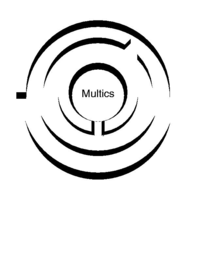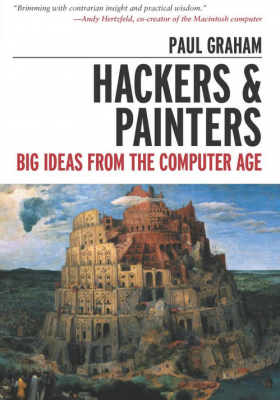Paul Graham: The Word "Hacker"
"The spirit of resistance to the government is so valuable in certain cases that I would like it to never be allowed to go out." Thomas Jefferson, founding father.

(The picture shows Steve Jobs and Steve Wozniak with their blue box project. Photo taken by Margret Wozniak. Courtesy of Steve Wozniak.)
Original - www.paulgraham.com/gba.html
Translation - Shchokotova Yana
(previous translation - "Revenge of the Botans" )
The word "Hacker"
April 2004
')
In the media, the word "hacker" is used to describe who hacks computers. In the software development environment, this word means a skilled programmer. But there is a connection between these two concepts. For programmers, a “hacker” is associated with skill in the most literal sense of the word: someone who can force a computer to do what it pleases , whether the computer itself wants it or not.
In addition to this confusion, we point out that the noun “hack” (English) also has two meanings. This word can be either a compliment or an insult. The word "hack" is used to describe the terrible result of your activity. But when you do something so talented that you somehow defeat the system, it is also called “hack.” This word is used most often in the first meaning, and not in the second, probably because bad decisions prevail over brilliant ones.
Believe it or not, believe it or not, but these two meanings of the word “hack” are also related. Bad and original solutions have something in common: they both go against the rules. And there is a gradual transition from breaking the rules, bordering on ugliness (using adhesive tape to attach something to your bike), to such breaking the rules, which is akin to brilliantly original (giving up Euclidean space).
Hacking originated before the advent of computers. While working on the Manhattan Project, Richard Feynman was entertaining, as he did, by hacking safes with secret documents. This trend continues to this day. When we studied in the magistracy, one of my hacker friends, who spent too much time around MIT, had his own set of “master keys” (he now manages the hedge fund, that is, he is engaged in activities that are not too far from his previous hobbies).
It is sometimes difficult to explain to the authorities why someone might want to do such things. Another friend of mine had problems with the government because of hacking computers. And only recently it was declared a crime, and the FBI discovered that their usual investigative techniques do not work. Obviously, the police investigation begins with a motive. There are few typical causes of crime: drugs, money, sex, revenge. Curiosity was not included in the list of motives of the FBI. In fact, the idea itself seemed alien to them.
People close to power are annoyed by the general principle of hacker disobedience. But this disobedience is a by-product of the synthesis of those qualities that make them skilled programmers. They can make fun of the executive director when he expresses himself with universal corporate speech, and they also laugh at someone else who claims that this particular task has no solution. You will suppress one thing, and you will restrain the other.
Sometimes this applies to the principle itself. Sometimes young programmers notice the oddities of prominent hackers and decide to adopt some of them in order to appear smarter. Fake is not only annoying; in fact, the touchiness and temper of these posers can slow down the innovation process.
But even considering their annoying eccentric qualities, the hacker disobedience principle is pure victory. And I would like the advantages of such a principle to find more support.
For example, I believe that in Hollywood, people are simply puzzled by the attitude of hackers to copyright. This is the eternal topic of hot discussion on Slashdot. But why should people who program computers be so worried about copyright, in the end?
Partly because some companies use mechanisms to prevent copying. Show any castle hacker how his first thought would be, and how to hack it. But there is a more serious reason why hackers are alarmed by tools like copyrights and patents. They perceive increasingly aggressive measures to protect “intellectual property” as a threat to the intellectual freedom that they need to do their work. And here they are right.
Looking into the gut of existing technologies, hackers develop ideas for future generations. “No, thank you,” intelligent homeowners might say, “we don’t need any outside help.” But they are wrong. Subsequent generations of computer technology are often — perhaps even more often than the other way around — being developed not by professionals, but by outsiders.

In 1977, no one doubted that a certain group at IBM was developing what they expected to be the next generation of business computers. They were wrong. The next generation of business computers was developed in a completely different way by two long-haired guys with the same name Steve in a garage in Los Altos. At about the same time, those in power united to develop the official version of the next generation operating system, Multics . But the two guys who thought Multics was overly complex, hid and wrote their own. They gave her a name with a joking reference to Multics - Unix.

Recent new intellectual property laws impose unprecedented restrictions on the kind of curiosity that leads to new ideas. Previously, competitors could use a patent to prevent you from selling copies of what they created, but they would not be able to stop you from examining any one part of the product in order to find out how everything works there. New laws have declared it a crime. How should we develop new technologies if we cannot study the existing ones in order to understand how to improve them?
Ironically, the hackers took it upon themselves. All the fault of computers. Control systems inside the machines are usually built on the basis of the physical principles of operation: drives, levers, cam mechanisms. More and more, the principle of operation (and, therefore, the value) of products lies in their programs. And by this I mean programs in a general sense, i.e. data. The song on the plate is physically the grooves in the plastic. The song on the iPod is only stored on it.
Data by definition is easy to copy. And the Internet makes them easy to distribute. It is therefore not surprising that companies are afraid. But, as often happens, fear clouded their minds. The government has responded with harsh intellectual property protection laws. Perhaps they were conceived for the good. But they may not even think that such laws will do more harm than good.
Why are programmers so vehemently opposed to these laws? If I were in the position of the legislator, I would be interested in this mysterious phenomenon - for the same reason as if I were a farmer and suddenly heard one night a loud cackle from a hen house, I would go out to see what it is. Hackers are not stupid, and unanimity is a rarity in this world. So if they all cluck, maybe something goes wrong.
Could it be that such laws, even aimed at protecting America, will actually harm her? Think about it. There is something too American about breaking into safes by Feynman during his work on the Manhattan project. It is difficult to imagine that the authorities reacted to such things with humor at that time in Germany. And perhaps this is not a coincidence.
Hackers are naughty. That's the essence of hacking. And this is also the essence of "Americanism." It is not by chance that Silicon Valley is located in America, and not in France, Germany, England or Japan. In those countries, people do not go beyond the delineated framework.
I lived for some time in Florence. But after several months of being there, I realized that what I unknowingly hoped to find there was in the place that I had just left. The reason Florence is famous for is that in 1450 it was New York. In 1450, it was filled with rebellious and ambitious people, such as you are now in America. (That's why I returned to America).
Quite a significant advantage of America is that it has a favorable environment for the desired type of recalcitrance, i.e. This home not only for smart, but also for the daring. And hackers are arrogant know-alls, no exceptions. If we had a national holiday, it would be the day of the first of April. Much says about our work that we use the same word for both brilliant and terribly poor decisions. When we reflect, we are not always 100% sure what kind of decision this will be. But as soon as a certain character of the necessary character appears in it, this is a promising sign. It is strange that people perceive programming as an accurate and systematic activity. These computers are accurate and systematic, and hacking is what you do at ease and with a smile.
In our world, some of the most typical solutions are not far from the subject of sharp jokes. Undoubtedly, IBM was quite surprised at the consequences of the DOS licensing case, just like the alleged “competitor”, when Michael Rabin figured out the problem by redefining it into one that was already easier to submit to the solution.
Cynical clever men are forced to develop a clear sense of how much they can carry . And not so long ago, the hackers felt a change in the environment, which was hatedlines rather disapprovingly about.
For hackers, the recent restriction of civil liberties seemed especially threatening, which would also mislead ignorant people. Why should we be so worried about civil liberties? Why is it more typical of programmers, and not dentists, sailors or landscape designers?
Let me describe the situation in terms that any government official would approve. Civil liberties are not only a reason for pride and an unusual American tradition. Civil rights enrich the country. If you draw a graph reflecting the dependence of GDP per capita on civil liberties, you would notice a clear pattern. Is civil liberty a reason, not just a consequence? I believe that the way it is. That a society in which people can do and say what they want will also become one where the most effective decisions win, and not those sponsored by the most influential people. Authoritarian states are becoming corrupt; corrupt countries turn into poor countries, and those, in turn, into weak ones. It seems that along with tax revenues, the Laffer curve also exists with respect to government authority. At least, it seems quite possible, so it would be foolish to conduct an experiment and check. Unlike high tax rates, you cannot cancel totalitarianism if it turns out to be a mistake.
That's what hackers are concerned about. Government espionage for people is not the direct reason why programmers write code worse. In the end, it will simply lead to a world in which bad ideas will prevail. And because for hackers it is so important, they are especially sensitive to such things. They sense the approach of totalitarianism from a distance, like animals that sense the approach of a thunderstorm.
It would be absurd if, as hackers fear, recent measures aimed at protecting national security and intellectual property would turn out to be a combat missile aimed directly at the cause of America’s success. And it would not be the first time when measures taken in a panic setting would have a different effect than expected.
There is such a thing as "Americanism . " If you want to learn this, then nothing will replace your experience of living abroad. And if you want to find out if something will nurture this quality or suppress it, it will be difficult to find a focus group better than hackers, because of those whom I know, they are closest to the realization of this quality. Perhaps even closer than the people who govern our country, who, after their speeches about patriotism, remind me more of Cardinal Richelieu or his follower Mazarin, and not Thomas Jefferson or George Washington.
When you read that the founding fathers have to speak in their defense, their speeches are more like hackers. "The spirit of resistance to the government," as Jefferson wrote, "is so valuable in certain cases, that I would like it to be never allowed to go out."
Imagine if the American president would say that today. Like the remarks of a frank old grandmother, the aphorisms of the founding fathers confused the generation of their less confident heirs. They remind us of where we come from. They remind us that it is people who break the rules that are the source of America’s wealth and power.
People who have sufficient authority to set the rules have the natural desire to follow these rules. But be careful with your requests. They can be satisfied.
Thanks to Ken Anderson, Trevor Blackwell, Daniel Giffin, Sarah Harlin, Shiro Kawai, Jessica Livingston, Matz, Jackie MacDone (Jackie McDonough), Robert Morris (Robert Morris), Eric Raymond (Eric Raymond), Guido van Rossum (Guido van Rossum), David Weinberger (David Weinberger), and Steven Wolfram (Steven Wolfram) for reading a draft of this article.
Edison 's blog is coming to an end, and next year they promised to tell you how their leading programmers had fun and bedrock among young people and students.

Hackers and painters
www.paulgraham.com/hptoc.html
- Why Nerds Are Unpopular
Their minds are not on the game.
original translation part 1 part 2 - Hackers and painters
Hackers are makers like painters or architects or writers.
original , translation part 1 , part 2 , alternative - What you cant say
How to think with them.
original translation - Good bad attitude
Like Americans, hackers win by breaking rules.
original translation - The other road ahead
Web-based software offers the largest since the arrival of the microcomputer. - How to Make Wealth
The best way to get rich. And startups are the best way to do that.
original translation - Mind the gap
Could "unequal income distribution" be less than a problem than we think?
original translation - A plan for spam
Till recently most experts thought spam filtering would not work. This proposal has changed their minds.
original translation - Taste for Makers
How do you make great things?
original translation - Programming Languages Explained
What is a programming language? - The Hundred-Year Language
How will we program in a hundred years? Why not start now?
original translation - Beating the Averages
For web-based applications. So can your competitors.
orininal , translation - Revenge of the Nerds
In technology, "industry best practice" is a recipe for losing.
original translation 1 , 2 , 3 - The dream language
A good programming language is hackers have their way with it.
original translation part 1 part 2 - Design and Research
Research has to be original. Design has to be good.
original translation
(it remains to translate only 2 chapters, who wants to help, join)
The remaining translations of Graham 's work are here .
Source: https://habr.com/ru/post/273511/
All Articles